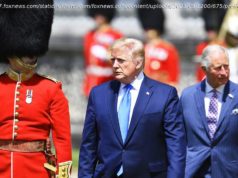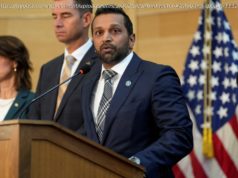With Islamic State all but ejected from one if its former capitals and surrounded in the other, members of a 72-nation coalition meet in Washington this week to try to ensure the battlefield victories do not, once again, evaporate amid new sectarian strife.
Iraq’s prime minister declared victory over Islamic State in Mosul on Monday, three years after the militants seized the city.
In neighboring Syria, U. S.-backed forces have entered Raqqa and are battling Islamic State militants there.
The battlefield advances are a potentially fatal blow to Islamic State’s self-proclaimed « caliphate, » but also bring fresh challenges and risks, according to Western diplomats and U. S. officials.
The key question, they said, is whether U. S. President Donald Trump, who has been leery of foreign assistance and « nation building, » and allies in Europe and the Middle East lead a long-term campaign of physical and political reconstruction.
« I think everyone has learnt the hard way that unless you stick around and get the job done, we’ ll be back there again in 10 years’ time, » said one Western diplomat, speaking on condition of anonymity.
One concern, the officials and diplomats said in interviews, is that Iran could fill the vacuum left by Islamic State to expand its clout in both Iraq and Syria.
Another is that the region’s Sunni Muslims, if not given a share of political and economic power, could be vulnerable to Islamic State recruitment as the group reverts from one that holds territory to a shadowy, violent insurgency.
Trump’s budget for fiscal year 2018, which begins Oct. 1, would allocate $13 billion for the military fight against Islamic State in Iraq and Syria.
« Are we going to spend even a fraction of the amount on reconstruction? » asked Jeremy Konyndyk, who oversaw disaster assistance at the U. S. Agency for International Development until January.
When the U. S. military withdrew from Iraq in 2011, U. S. aid budgets and personnel were reduced as well, said Konyndyk, now at the Center for Global Development. « We should not make the same mistake this time (of) taking a really military-centric approach to our engagement and once the military job is done, stripping out most of the other tools. »
The Washington meetings Tuesday through Thursday will focus on ways to intensify a multi-pronged campaign against Islamic State, according to the State Department. That campaign and the overall military strategy were set under Trump’s predecessor, U. S. President Barack Obama.
Trump’s post-conflict strategy, as described by U. S. officials, follows two tracks.
The United States, they say, will support a robust Iraqi- and United Nations-led effort to stabilize liberated areas in Iraq, where American officials say they have a reliable partner in Prime Minister Haider al-Abadi.
But amid Syria’s ongoing civil war, Washington is pursuing a more cautious, localized stabilization plan.
Initial stabilization efforts are already underway in eastern Mosul, but officials said the western part of the city, where fighting was more intense, will be the greater challenge.
Nearly 1 million civilians fled the city, according to the United Nations. « This was beyond our worst-case scenario and we’ re still one step ahead, » thanks to $1 billion in funding pledged last year, said Lise Grande, U. N. Humanitarian Coordinator for Iraq.
Across Iraq, 1.9 million people have returned home, Grande said, adding « I’m not sure you would have bet on this. »
Top Trump aides, including national security adviser H. R. McMaster and Defense Secretary Jim Mattis, commanded U. S. troops in Iraq and remain committed to the country’s security, diplomats and analysts said.
« The strategy in Iraq will be to prevent an ISIL (Islamic State) recurrence and to prevent an expulsion of the U. S. by Iranian-backed actors. The two issues are viewed as linked, » said Michael Knights, a fellow at the Washington Institute for Near East Policy think tank.
« There is a lot of Iraq experience inside this administration and it shows in the long-term commitment to Iraqi security that is being offered, » Knights said.
Pushing back against Iranian influence won’t be easy. Tehran wields clout through some Iraqi politicians and Shiite militias, which have recently deployed towards Iraq’s border with Syria.
Syria is even more fraught, officials said, with its multi-sided civil war that has drawn in outside powers including the United States, Russia, Iran and Turkey.
In Syria, « the campaign against ISIS is moving faster than resolution of the underlying political challenges, » a State Department official said, using another acronym for Islamic State. « That has led us to really emphasize the local solutions. »
Washington, he said, is backing local civilian councils to provide basic governance in areas U. S.-backed forces have retaken, such as the city of Tabqa and, ultimately, Raqqa.
The U. S.-led military coalition’s focus is on the quick restoration of essential services, « getting the lights back on. We’ re not reconstructing Syria, ” the official said.
There are also tensions over who should pay for what. U. S. and other Western officials argue that Russia, which intervened to help Syrian President Bashar Assad, should contribute.
(Additional reporting by Jonathan Landay, Phil Stewart and Arshad Mohammed; Editing by Yara Bayoumy and James Dalgleish)






